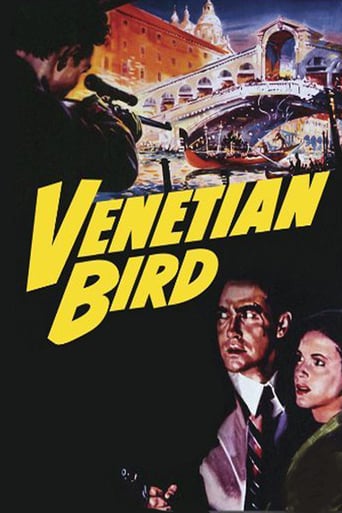blanche-2
Richard Todd stars in "The Assassin" with Eva Bartok and George Coulouris, from 1952, shot in Venice.Todd plays Edward Mercer, who comes to Venice on behalf of an insurance company, looking for a man named Uccello who has a reward coming for the rescue of an Allied airman during the war. Unfortunately for Mercer, the first person he's supposed to see is dead. Then he meets Adrianna (Bartok), who knew Uccello, and he is told that Uccello is dead. After a while, though, he begins to think that's not the case.The director, Ralph Thomas, borrowed a good deal from Hitchcock in this film and did some effective things, particularly at the end, which is marvelous. He also used Venice and its surroundings very well to create an excellent atmosphere. If only the script had been less talky and the plot better, you might really have something here.Bartok is mysterious, Richard Todd is very serious and quite handsome, and Venice is beautiful, even in black and white. Well worth seeing for that.
LCShackley
This film, although not as well-crafted as THE THIRD MAN or THE MAN BETWEEN, is definitely in their league; it's a taut, post-war mystery in which a European city (in this case, Venice) is one of the most important characters. The main human character, Edward Mercer (Richard Todd), is a Hitchcockian protagonist: a man trying to prove his innocence in ever more dire circumstances.The plot does get convoluted at times, but director Ralph Thomas always keeps your eyes interested with wonderful location shots. The cast is solid, and Sid James is given a rare dramatic role. The ending, also with Hitchcockian overtones, is thrilling and a fine bit of camera work and direction. (May I recommend that after you finish the film, go back and watch the first few minutes again. You'll see how cleverly the motifs of the film are tied together.)
tedg
Many of these detective series had to be formulaic. That is the nature of a series. So if you want to differentiate, one strategy is to introduce exotic locations. When this was made, that was still rare. The location has to be highlighted in the name, so we have Charlie Chan, the Saint, the Falcon and so in such and such a city. The place here is Venice. Unfortunately it is not captured well. For some reason, the texture of the city escapes the usual camera. (I did like the color you got in the Clooney "The Job" and the Bond "XXX").So the setting is largely wasted by the clumsy camera, except for a visit to a Murano glassworks. The glass factories are located on an island near the city because of the ancient fear of fire. These for hundreds of years have been a wonder of the world, once secret, now a bit tired. When this film was made, Chihuly had not yet brought Murano to our attention and the polluting effect of tourism had not occluded its magic.It is only a few minutes in this otherwise ordinary adventure. And it is just background motion. But you might as I, hold it a dear experience to just see.Ted's Evaluation -- 2 of 3: Has some interesting elements.
JohnHowardReid
A millionaire hires a private detective to find and reward a wartime partisan who saved his life. Unfortunately, the man does not want to be found. Sound familiar? It ought to be. "Family Plot" is a blatant variation.One of the best cinema translations of a mystery thriller ever made, the pacily-directed "Venetian Bird" started life as a gripping page-turner by Victor Canning who was, most fortunately, called upon to write the screenplay from his own book by astute producer, Betty Box, who saw to it that a fine cast of players headed by Richard Todd, Eva Bartok and Walter Rilla were assembled and flown to the suitably noirish Venice locations where the film was actually photographed.From its attention-grabbing credits superimposed on a high angle over St Mark's Square, and underlined by Nino Rota's superlatively evocative music score, to the thrilling conclusion in that same square (astutely borrowed from Orson Welles' "The Stranger"), "Venetian Bird" is a high-flying movie. (What idiot changed Victor Canning's most appropriate title to "The Assassin"? No wonder all the movie's fans live abroad! The American title gives half the plot away before a patron even enters the theater or switches on the TV. As he twiddles his thumbs while he sits through all the now non-suspenseful exposition of the first half of the film, the American viewer must wonder why all the on-screen characters are so incredibly stupid. If you know the plot even before Richard Todd swings into action—and "swings" is the word, because he performs all his own breathtaking stunts—and the super-lovely Eva Bartok brings an otherwise spellbinding touch of mystery to her enigmatic role, you may well conclude that "Venetian Bird", despite all its atmospheric trappings, is no masterpiece of suspense.All the same, it's still difficult to downgrade Ernest Steward's strikingly somber, moody camera-work, or the charisma of the players. Only the normally reliable John Gregson fails to convince. Fortunately, his part is small. The support cast is otherwise in the reliable hands of people like Walter Rilla's delightfully suave and sinister villain, and Margot Grahame's fine-tuned, carelessly guiltless charmer.


